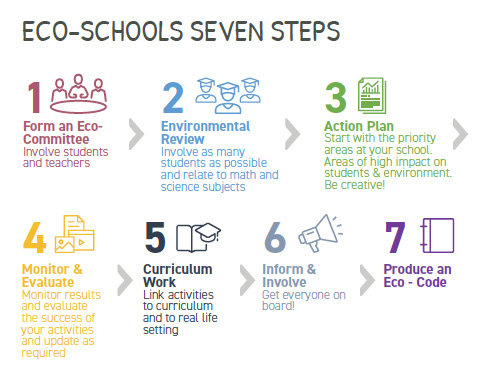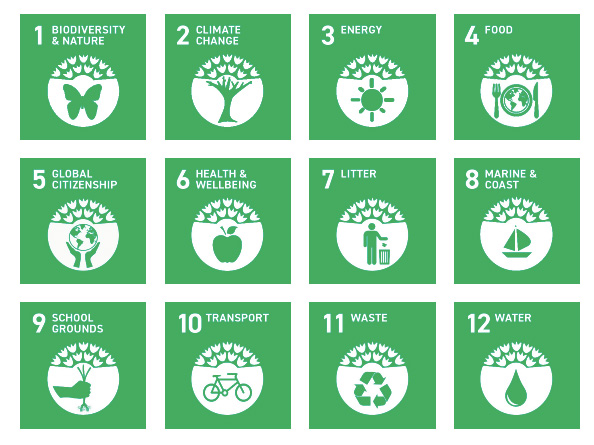The Eco-Schools program, led by the Foundation for Environmental Education (FEE), is the largest global sustainable schools program. It starts in the classroom and expands to the community by engaging the next generation in action-based learning.
It involves schools committing to a two-year program, which encourages young people to engage in their environment by allowing them the opportunity to actively protect it, culminating in them achieving a green flag award.
Throughout the program, young people experience a sense of achievement through being able to lead positive change in their school’s environmental management policies and in bringing environmental education and awareness to their peers. To learn more about Eco-Schools click here.
Starting from 2018, Earthna Center for a Sustainable Future, taking the responsibility over from the previous operator, the Qatar Green Building Council, became the National Operator for Eco-Schools Qatar. Earthna works to maintain high standards and support the engaged schools through their positive actions to transform behavior in schools and communities towards sustainability.
The Eco-Schools program consists of three elements:
- The Seven Steps Framework
- The Eco-Schools Themes
- Assessment for the Green Flag
Seven Steps towards an Eco-School

Eco-Schools Themes

Biodiversity & Nature
Examines the flora and fauna present in the school environment and suggests ways to increase the levels of biodiversity around the school and raises the pupils’ awareness of biodiversity and nature.
Climate Change
Examines the impacts we have on the Climate through our lifestyles and how our actions can influence the situation in a positive way.
Energy
Suggests ways in which all members of the school can work together to increase awareness of energy issues and to improve energy efficiency within the school.
Food
Encourages young people, their parents, and the whole community to take responsible food-related choices and actions that protect the environment, promote human rights, and improve the wellbeing of society - every day.
Global Citizenship
Examines what our rights and responsibilities are on a National, European and Global scale and encourages staff, students and parents to look at the impacts our consumption habits have on other parts of the world.
Health & Wellbeing
Encourages schools to promote the health and wellbeing of young people and the wider community and to make environmental connections to health and safety.
Litter
Examines the impact of litter on the environment and explores practical means for reducing and minimising the amount of litter produced by the school.
Marine and Coast
Teaches children about local and/or global coastal and marine habitats, how people are affecting these habitats and what we can do to protect them.
School Grounds
Encourages schools to introduce children to the natural environment and to biodiversity in a practical way by offering a safe and potentially exciting facility for outdoor education that can complement classroom-based activities.
Transport
Suggests ways for pupils, staff and local government to work together to raise awareness of transport issues and come up with practical solutions that will make a real difference to pupils’ everyday lives.
Waste
Examines the impact of waste on the environment and explores actions to minimise the amount of waste that we produce and dispose of on a daily basis.
Water
Provides an introduction to the importance of water both locally and globally and raises awareness of how simple actions can substantially cut down water use.
Participation in the Eco-Schools program involves the following steps:
- Schools register to show interest in program participation
- The Eco-Schools team contact the school to discuss how the program works
- Schools apply the Eco-Schools’ Seven Steps Framework
- After two academic years, schools submit an application to become an Eco-School, providing supporting documents and evidence to demonstrate their activity and commitment
- The Eco-Schools Team reviews the application and assigns a third-party assessor to evaluate whether the Green Flag can be awarded
- The Green Flag is renewed every two years
Eco-Schools Downloads:
- Eco-Schools registration form
- Eco-Schools application form
- Eco-Schools handbook
- Eco-Schools handbook Arabic
- Eco-Schools fee structure
- Eco-schools renewal form
For more information, please contact:
